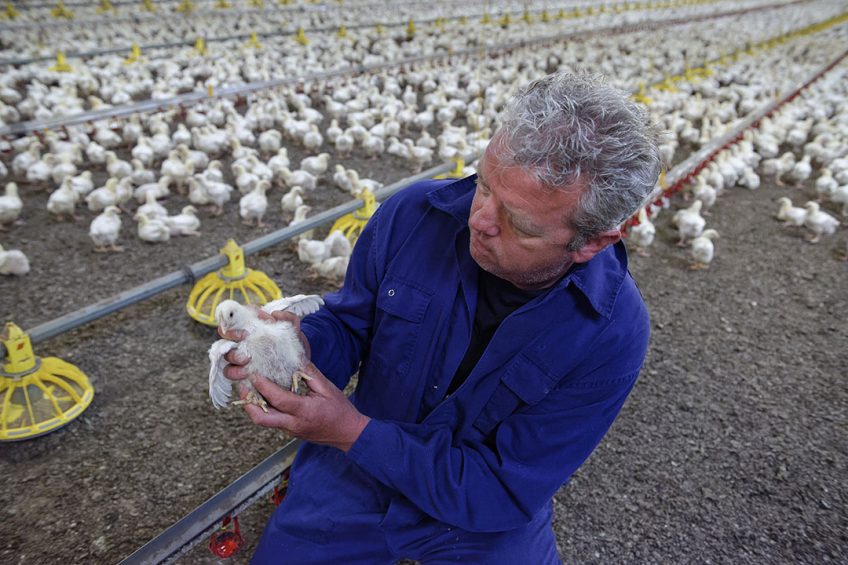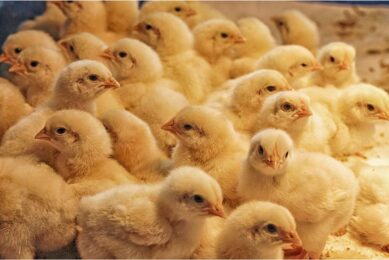Gradual drop in sick birds

Animal health in the poultry sector will improve in the coming years. The reasons are, among other things, breeding, vaccine development, better feed, housing and management. The need for antibiotic usage will also decrease.
Over the next couple of years, there will be a lot of changes in the field of animal health care in poultry farming. Scientific research will provide new insights and new possibilities to work on improving animal health. In addition to this, societal and political preferences are also changing which may impact animal healthcare. For example consider the increasing pressure on the use antibiotics. Changes is poultry farming will have consequences for animal healthcare also. An example of this is the trend to hatch broilers in the poultry house.
Animal welfare
Attention to animal welfare has grown over the past couple of years. “This will remain the case for the coming years,” says Paul Cornelissen, vet at poultry veterinary practice Noord & Oost, Slagharen, the Netherlands. He is also the chairman of the poultry professional group within the Dutch veterinary organisation KNMvD. “This is will be reflected in the training for veterinarians, with the results leading to a growing number of vets who will focus more on animal welfare within their work.”
It seems that future poultry vets will operate in a sector that has a little more wiggle room than in the past. The focus will shift more towards welfare, which is, for example, the amount of space per animal in the poultry house, but also on the feed. “There is much to be gained in the poultry feed area,” says vet Gerwin Bouwhuis from the Poultry Health Centre (Gezondheidscentrum voor Pluimvee, the Netherlands). “I expect that we will switch to feed with less protein, which will be beneficial to the animal’s gut. In addition to more locally grown protein, which is fine, it is also evident that insects will become part of the poultry ration in the future. This is a positive development, because chickens are naturally omnivores that eat both seeds, herbs, worms and insects.”
Fewer vets
Poultry farmers will also feel the consequences of the decreasing number of vets that will specialise in farmed animals. For the poultry sector this means less poultry vets. Cornelissen: “This will influence the vets’ work. They will take on more of a managing role. Other people will have to perform tasks such as blood and collecting salmonella samples.”
Antibiotics
Poultry health specialists expect that the use of antibiotics will decrease further. “10 years ago, 60 to 70% antibiotic use was connected to problems in the digestive system. These problems hardly occur now due to better feed and management,” says Bouwhuis. “Right now, the use of antibiotics largely focuses on dealing with enterococcus infections”. He expects that the market will determine the pace in the reduction of antibiotics use. Cornelissen: “I think that a reduction to 0 is a very real possibility.” Bouwhuis also expects that the resistance against so-called ionophoric coccidiostats will increase in the future. “This means that we have to find other ways to control coccidiosis. I propose using a strict schedule with chemical coccidiostats that are alternated with vaccination.”
More vaccines
Peter Wijnen, vet at the Poultry Practice the Achterhoek (PPDA), the Netherlands, concludes that a further reduction of antibiotic use requires poultry to be better protected against bacterial pathogens. “On the one hand, this can be achieved this by applying even stricter farm hygiene regulations. On the other, vaccination offers possibilities to improve the animal’s immune system.” Wijnen sees that the pharmaceutical industry is working hard to improve the possibilities of protecting poultry against diseases through vaccinations. “New vaccines will enter the market in the next couple of years. These are for example combination vaccines that will protect poultry against multiple diseases at the same time.”
The possibilities for in-ovo vaccination, or vaccinating in the egg, will increase in the coming years, even though this is not a suitable application for all diseases. Whether in-ovo vaccination will really take off, largely depends on the costs, according to experts. “Economics also count,” says Cornelissen.
The arrival of a practically usable vaccine that protects poultry against bird flu or avian influenza (AI) also seems to be a possibility in the future. “However, the use of such a vaccine is often strongly dependent on possible trade barriers,” says Bouwhuis.
Animal health in 2030
– A healthy chicken is more resilient to disease
– There will be less vets who are specialised in farmed animals, which means there will also be less poultry vets. Remaining vets will assume more managerial roles.
– The use of antibiotics will possibly disappear; feed and housing quality will gain importance.
Free-range
The fact that birds have increasingly more access to outdoor space, has consequences for animal welfare. “Free-range is good for the sector’s image. There are however, two sides to the health aspect. On the one hand, it means more space, fresh air, less animals per square meter and less disease pressure. On the other hand, the risk of contact with wild birds and other pathogen carriers increases. Proper hygiene management and design of the free-range areas are necessary. The location of free-range farms is also important for the prevention of disease risks. Fortunately, farms in the Netherlands are managed well, which leads to health benefits and controllable health risks,” concludes Wijnen.
Author:
Berrie Klein Swormink
Join 31,000+ subscribers
Subscribe to our newsletter to stay updated about all the need-to-know content in the poultry sector, three times a week. Beheer
Beheer






 WP Admin
WP Admin  Bewerk bericht
Bewerk bericht